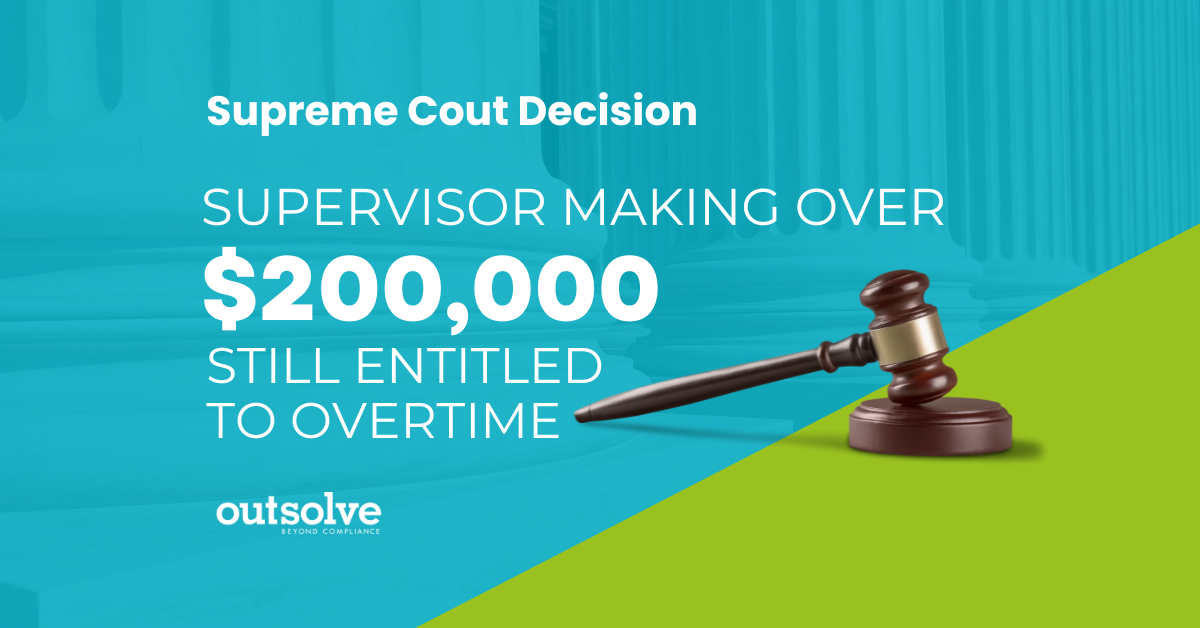1 min read
Supervisor Making Over $200,000 per Year is Still Entitled to Overtime
 John Weathington III
:
Feb 28, 2023 9:30:00 AM
John Weathington III
:
Feb 28, 2023 9:30:00 AM

In a split decision by the U.S. Supreme Court decided February 22, 2023, Helix Energy Solutions Group, Inc. et al. v. Hewitt, an oil rig supervisor earning over $200,000 per year sued for overtime. Hewitt typically worked 84 hours per week on the offshore drilling vessel and was paid a flat daily rate and then had 28 days off before returning to the vessel. Hewitt filed an action against Helix seeking overtime pay under the Fair Labor Standards Act of 1938, which guarantees overtime pay to covered employees when they work more than 40 hours a week. Helix defended on the grounds that Hewitt was a highly compensated, exempt, executive employee.
Under applicable regulations, an employee is considered a bona fide executive excluded from the Fair Labor Standards Act (FLSA) protections if the employee meets three distinct tests:
- the “salary basis” test, which requires that an employee receive a predetermined and fixed salary that does not vary with the amount of time worked;
- the “salary level” test, which requires that preset salary to exceed a specified amount; and
- the job “duties” test. See 84 Fed. Reg. 51230.
The Secretary of Labor has implemented the bona fide executive standard through two separate and slightly different rules, one “general rule” applying to employees making less than $100,000 in annual compensation, and a different rule addressing “highly compensated employees” (HCEs) who make at least $100,000 per year. 29 CFR §§541.100, 541.601(a), (b)(1). The primary dispute was whether Hewitt met the requirement under Department of Labor regulations of being paid on a salary basis. The Supreme Court determined that Hewitt did not meet the salary basis requirements of § 541.602(a) merely because he always received more than the required minimum salary amount on his biweekly paychecks.

OutSolve’s Take
An employer should be able to demonstrate compliance with every single element of an FLSA exemption exactly as set forth in the regulations, so OutSolve clients should review their compensation structures for exempt employees carefully to ensure the salary basis and duties tests are met for highly compensated employees.
- A traditional “salary basis” compensation structure as defined in 29 C.F.R. § 541.602(a) is met only when the worker is guaranteed the minimum required amount ($684) on a weekly basis; and
- Daily-rate employees can satisfy this salary basis test, but only if the employee’s wages include a guaranteed minimum amount they receive “regardless of the number of… days or shifts worked, and a reasonable relationship exists between the guaranteed amount and the amount actually earned.”
For more information on compensation compliance, contact OutSolve today.
John Weathington is a corporate and energy attorney who is a long-time client of, and counsel to OutSolve.
Recent Posts

Countdown: Final Days of the 90-Day Safe Harbor Period for EO 11246
Related Posts

EEO-1 Reporting Requirements: A Complete Guide
EEO-1 Reporting Deadline 2024 Recently submitted documents to the Office of Management and Budget (OMB) indicate a proposed open data collection...

New Jersey Pay Transparency Laws: What You Need to Know
The topic of pay equity continues to gain attention across the United States, and New Jersey (NJ) is no exception. In fact, NJ is preparing to...

Why Companies and Institutions Should Fear False Claims Act Lawsuits When Signing Coming Federal Contract and Grant Certifications
OutSolve has invited John C. Fox, Esq. as a guest blogger providing legal insights on EEO and compliance issues. The views expressed in his posts are...

